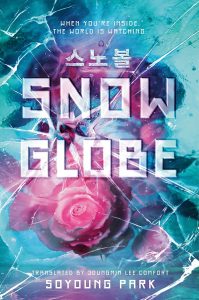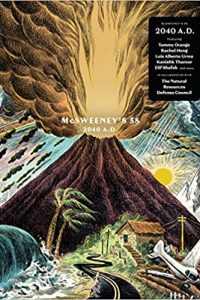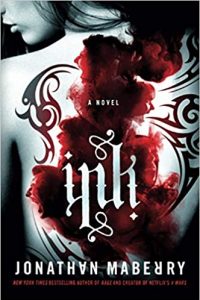Ian Mond Reviews Snowglobe by Soyoung Park
 Snowglobe, Soyoung Park (Delacorte 978-0-59348-497-5, $20.99, 384pp, hc) February 2024.
Snowglobe, Soyoung Park (Delacorte 978-0-59348-497-5, $20.99, 384pp, hc) February 2024.
There’s significant whiplash going from the oppressive darkness of Yeji Y. Ham’s The Invisible Hotel to the propulsive plotting and excitement of Soyoung Park’s debut young-adult novel Snowglobe (translated from Korean by Joungmin Lee Comfort). Set two centuries into the future, we are presented with a world (or at least the tiny portion we see) blanketed in snow and ice, the temperature 50 degrees below freezing (thank you, climate change). Against this chilly backdrop, Jeon Chobham lives with her twin brother Ongi, her mother and grandmother in a settlement on the fringes of what’s left of civilisation. There, they spend their days at the local power station producing electricity, most of which goes to Snowglobe, the climate-controlled city ‘‘built atop a geothermal vent… enclosed in a gigantic weatherproof glass dome.’’ In exchange for providing the domed city with its energy, the privileged residents of Snowglobe ‘‘share their lives… in the form of reality TV shows.’’ That’s right, Snowglobe is essentially a massive studio run by the exceedingly powerful Yi family and their media conglomerate, the Yibonn Media Group.
To live in Snowglobe, you must be an actor or a director. Chobham dreams of becoming a director, of developing a show as popular as The Goh Haeri Show starring the titular Haeri, the Taylor Swift of the postapocalypse – to whom Chobham shares a striking resemblance. Unfortunately, her application to Snowglobe’s Film Academy (‘‘the most prestigious educational institution in the world’’) has recently been rejected, meaning she will never escape the cold or the drudgery of the power plant. And then, one night, a limousine rocks up to Chobham’s settlement. Inside is Cha Seol, the critically acclaimed and award-winning director of The Goh Haeri Show. She comes with tragic news and a proposal. The night before, Haeri took her own life. With a replacement needed, who better to play the role than Haeri’s doppelgänger, Jeon Chobham?
Snowglobe has been accurately compared to The Hunger Games and Squid Game (as a Doctor Who fan, I can’t help but throw in the Season 22 Colin Baker serial ‘‘Vengeance on Varos’’). Like Katniss, Jeon Chobham is a ‘‘have-not’’ living a dystopian existence who is sent to the abundance and privilege of the Snowglobe, where she will upset the status quo. Like Squid Game, there are shows where the ‘‘actors’’ die, including a once- popular programme, now cancelled, featuring a serial killer who murders her nine lovers. But as you delve deeper into the novel, you realise that the comparisons are only surface-level. Snowglobe is not nearly as interested in authoritarianism (The Hunger Games) or late-stage capitalism (Squid Game) but is a more intimate affair, a story about psychological abuse, bodily autonomy, and a desire for justice. As such, the underlying foundations of Snowglobe, churning out reality TV for the excited but impoverished masses, is never really under threat. That might change in the sequel (Snowglobe is the first book of duology), but in this novel, we don’t get the sort of high-stakes, heroic individualism (and associated love triangles) that we’ve come to expect from young adult dystopias. It’s a refreshing change.
Snowglobe is also a blast to read. Peppered with coincidences, betrayals, cliffhangers, and magical mirrors that are never fully explained, the propulsive, by-the-seat-of-your-pants plot essentially mimics the reality TV shows watched by the frozen millions living outside the city. Whether this is coincidental or a sly bit of metanarrative, I can’t say, but it makes for great fun, nonetheless. Yes, you need to squint your way through some of the worldbuilding (it’s not entirely clear how agriculture works in below-freezing temperatures), but the way the narrative shifts under your feet, going from a Cinderella story – complete with missing glass shoe – to a thrilling heist with Chobham and her friends (whom I can’t reveal, because spoilers) forced to break back into Snowglobe is terrific. The novel has its serious side, especially concerning self-harm and the psychological abuse of children, but for the most part, Snowglobe is an espresso shot of plot, undiluted and buzzy, populated with memorable characters and several exhilarating set-pieces. Will I be reading the sequel? You betcha.
Ian Mond loves to talk about books. For eight years he co-hosted a book podcast, The Writer and the Critic, with Kirstyn McDermott. Recently he has revived his blog, The Hysterical Hamster, and is again posting mostly vulgar reviews on an eclectic range of literary and genre novels. You can also follow Ian on Twitter (@Mondyboy) or contact him at mondyboy74@gmail.com.
This review and more like it in the March 2024 issue of Locus.
 While you are here, please take a moment to support Locus with a one-time or recurring donation. We rely on reader donations to keep the magazine and site going, and would like to keep the site paywall free, but WE NEED YOUR FINANCIAL SUPPORT to continue quality coverage of the science fiction and fantasy field.
While you are here, please take a moment to support Locus with a one-time or recurring donation. We rely on reader donations to keep the magazine and site going, and would like to keep the site paywall free, but WE NEED YOUR FINANCIAL SUPPORT to continue quality coverage of the science fiction and fantasy field.
©Locus Magazine. Copyrighted material may not be republished without permission of LSFF.






